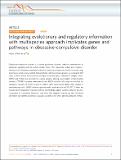Integrating evolutionary and regulatory information with a multispecies approach implicates genes and pathways in obsessive-compulsive disorder
Author(s)
Noh, Hyun Ji; Flannick, Jason; O’Dushlaine, Colm; Swofford, Ross; Howrigan, Daniel; Genereux, Diane P.; Johnson, Jeremy; van Grootheest, Gerard; Grünblatt, Edna; Andersson, Erik; Djurfeldt, Diana R.; Patel, Paresh D.; Koltookian, Michele; M. Hultman, Christina; Pato, Michele T.; Pato, Carlos N.; Rasmussen, Steven A.; Jenike, Michael A.; Hanna, Gregory L.; Stewart, S. Evelyn; Knowles, James A.; Ruhrmann, Stephan; Grabe, Hans-Jörgen; Wagner, Michael; Rück, Christian; Mathews, Carol A.; Walitza, Susanne; Cath, Daniëlle C.; Lindblad-Toh, Kerstin; Tang, Ruqi; Feng, Guoping; Karlsson, Elinor; ... Show more Show less
Downloads41467-017-00831-x.pdf (1.933Mb)
PUBLISHER_CC
Publisher with Creative Commons License
Creative Commons Attribution
Terms of use
Metadata
Show full item recordAbstract
Obsessive-compulsive disorder is a severe psychiatric disorder linked to abnormalities in glutamate signaling and the cortico-striatal circuit. We sequenced coding and regulatory elements for 608 genes potentially involved in obsessive-compulsive disorder in human, dog, and mouse. Using a new method that prioritizes likely functional variants, we compared 592 cases to 560 controls and found four strongly associated genes, validated in a larger cohort. NRXN1 and HTR2A are enriched for coding variants altering postsynaptic protein-binding domains. CTTNBP2 (synapse maintenance) and REEP3 (vesicle trafficking) are enriched for regulatory variants, of which at least six (35%) alter transcription factor-DNA binding in neuroblastoma cells. NRXN1 achieves genome-wide significance (p = 6.37 × 10⁻¹¹) when we include 33,370 population-matched controls. Our findings suggest synaptic adhesion as a key component in compulsive behaviors, and show that targeted sequencing plus functional annotation can identify potentially causative variants, even when genomic data are limited.
Date issued
2017-10Department
Massachusetts Institute of Technology. Department of Brain and Cognitive SciencesJournal
Nature Communications
Publisher
Nature Publishing Group
Citation
Noh, Hyun Ji et al. “Integrating Evolutionary and Regulatory Information with a Multispecies Approach Implicates Genes and Pathways in Obsessive-Compulsive Disorder.” Nature Communications 8, 1 (October 2017): 774 © 2017 The Author(s)
Version: Final published version
ISSN
2041-1723